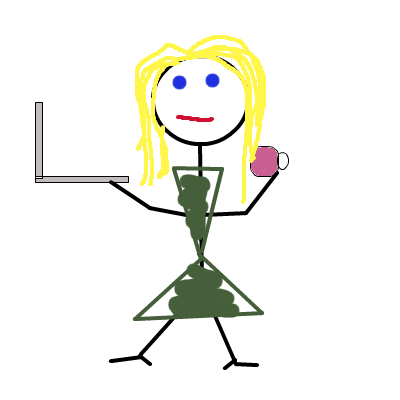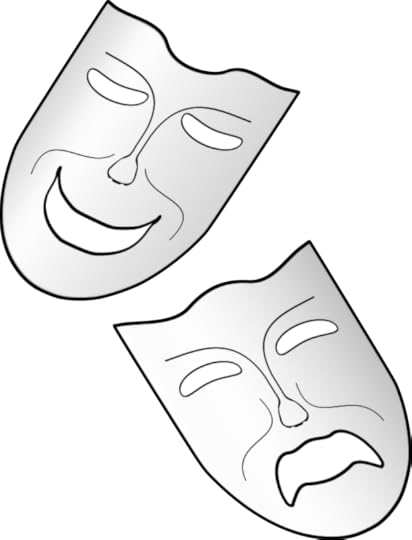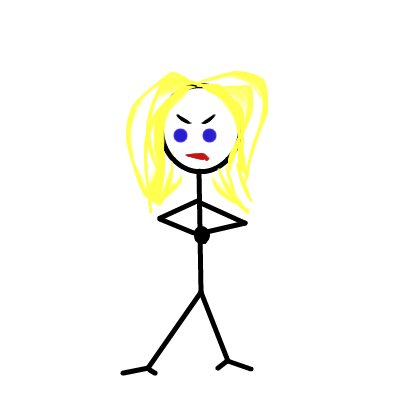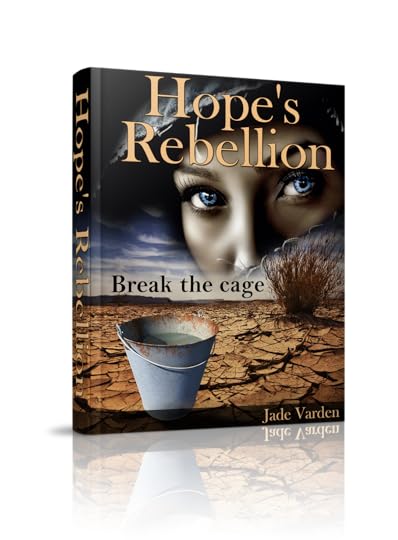Jade Varden's Blog, page 27
August 28, 2014
Writing 101: Do You Know Your Main Character?
When people read your book, you want them to have a strong sense of who your main character is. So if you don't know, they're not going to get that out of your pages. And when audiences can't connect with a character, the book isn't going to do well. So today we have to ask a question: do you know your character?

Identifying Characteristics
Think about your main character...and now interrogate yourself. What are the identifying characteristics of this character? Don't tell me what they look like -- I'm not interested in hair or tattoos right now. Is the character brave? Honest? Sneaky? Cunning? Funny? Shy? If you can't answer, you haven't done your job as a writer. Because I'm not the only one who will ask. Your readers will, too.
For each main character in each of your books, you should be able to identify at least three personality traits that help make this person who they are. Nothing that has to do with looks. Personality traits mean are they greedy? Are they generous? Hard-working? Talkative? Selfish? Mean-spirited? Kind? Be able to name at least three characteristics like this. If you can't, you've got a problem.
Think about all the iconic characters you've read. For example, I love Scarlett O'Hara. I would describe her as selfish, ambitious and stubborn. Anne of Green Gables is talkative, friendly and intelligent. Both these characters are complex, and have many more personality traits than this. But the point is, most people who have read these books can easily identify personality traits for these characters.
You want your main characters to come across the readers the same way: with strong personalities that they can see on the page. Write scenes that show these personality traits. If your character is brave, have them do something brave (like when Ponyboy and Johnny saved the little kids in The Outsiders). If they're cowardly, have them do something cowardly (like hide from an enemy).
In other words, know what your character is like. Know the traits they have. Once you've got that, it will be much easier to transfer that to the page...and that makes it possible for readers to see the traits you created. The ultimate goal is for everyone to know who your main characters is, and it begins with you.

Identifying Characteristics
Think about your main character...and now interrogate yourself. What are the identifying characteristics of this character? Don't tell me what they look like -- I'm not interested in hair or tattoos right now. Is the character brave? Honest? Sneaky? Cunning? Funny? Shy? If you can't answer, you haven't done your job as a writer. Because I'm not the only one who will ask. Your readers will, too.
For each main character in each of your books, you should be able to identify at least three personality traits that help make this person who they are. Nothing that has to do with looks. Personality traits mean are they greedy? Are they generous? Hard-working? Talkative? Selfish? Mean-spirited? Kind? Be able to name at least three characteristics like this. If you can't, you've got a problem.
Think about all the iconic characters you've read. For example, I love Scarlett O'Hara. I would describe her as selfish, ambitious and stubborn. Anne of Green Gables is talkative, friendly and intelligent. Both these characters are complex, and have many more personality traits than this. But the point is, most people who have read these books can easily identify personality traits for these characters.
You want your main characters to come across the readers the same way: with strong personalities that they can see on the page. Write scenes that show these personality traits. If your character is brave, have them do something brave (like when Ponyboy and Johnny saved the little kids in The Outsiders). If they're cowardly, have them do something cowardly (like hide from an enemy).
In other words, know what your character is like. Know the traits they have. Once you've got that, it will be much easier to transfer that to the page...and that makes it possible for readers to see the traits you created. The ultimate goal is for everyone to know who your main characters is, and it begins with you.
Published on August 28, 2014 05:30
August 27, 2014
Writing 101: What About Your Friends?
I've been writing, and I'm using the word loosely, since I was a young child. It's always been my passion and it's always been what I do. And it wasn't until recently that I started thinking about what it must be like to be on the other side. When I asked someone close to me if it's hard to be a friend or family member of a writer, there was no hesitation. The answer was a strong "yes!" So maybe us writers ought to keep that in mind in the future. Don't forget about what it's like for your friends and family...because honestly, you're hard to live with.

Shhh...Writing
I probably mutter "I'm busy" or "I'm writing" at least once a day to someone who's trying to talk to me. I don't look at the person I'm addressing. I can't, because I'm busy staring at the screen. I've shushed people, I've dismissively waved them away, I've allowed them to talk to me for upwards of 5 minutes at a time without informing them that I am not listening. It's rude, I know, but what can I say? When I'm writing, I'm not in this world. I'm in a different one...so who are all these people who are attempting to invade it?
Friends and family, usually. And like me, maybe you need to remember to look at things from their side, every so often.
The Other Side of the Screen
Honestly, I'm not all that familiar with what it's like to live with a writer or spend a lot of time with one, but I do know what I'm like with my friends and family. Sometimes, I have to skip out on events or shut myself in a room or stay up until all hours working on what I'm writing. My schedule varies from one day to the next. And when I get stuck, I'll just suddenly stand up and start pacing -- and it doesn't even matter where I am or if there's room to pace. I'll pace, no matter how small my area. I might talk out loud, or randomly start to cry, laugh completely out of context or just suddenly turn off the television and anything else that might be making noise. Sometimes, I can't deal with noise.
And while I don't live with a writer, I can imagine that all these things make it pretty darned hard to live with me...and lots of other writers who do similar stuff, too. Annoying quirks and scheduling difficulties like this are really just the tip of the iceberg.
Writers may also try to bounce ideas off people close to them, and they're definitely going to ask friends and family members to read something they've written. They might ask friends and family to buy something, to write reviews, to go around talking about the book, to get on Twitter -- they're your friends and family, so you feel comfortable asking. But it's also probably annoying to those people, who are mostly just trying to watch videos on Facebook (or whatever).
I don't think about that stuff very often, but I should. And all writers probably should. Take the time, every so often, to thank your friends and family for their support. Apologize for all the times you've totally had to blow them off or lock the door. Think about things from their side, and make sure they understand that it has nothing to do with them. Writing is one of the hardest things anyone can do...so a little bad behiavor is probably to be expected.
For much better insights on this topic, visit friend of the blog Annalisa Crawford. She has a busy family life, and she's covered this topic in the past.

Shhh...Writing
I probably mutter "I'm busy" or "I'm writing" at least once a day to someone who's trying to talk to me. I don't look at the person I'm addressing. I can't, because I'm busy staring at the screen. I've shushed people, I've dismissively waved them away, I've allowed them to talk to me for upwards of 5 minutes at a time without informing them that I am not listening. It's rude, I know, but what can I say? When I'm writing, I'm not in this world. I'm in a different one...so who are all these people who are attempting to invade it?
Friends and family, usually. And like me, maybe you need to remember to look at things from their side, every so often.
The Other Side of the Screen
Honestly, I'm not all that familiar with what it's like to live with a writer or spend a lot of time with one, but I do know what I'm like with my friends and family. Sometimes, I have to skip out on events or shut myself in a room or stay up until all hours working on what I'm writing. My schedule varies from one day to the next. And when I get stuck, I'll just suddenly stand up and start pacing -- and it doesn't even matter where I am or if there's room to pace. I'll pace, no matter how small my area. I might talk out loud, or randomly start to cry, laugh completely out of context or just suddenly turn off the television and anything else that might be making noise. Sometimes, I can't deal with noise.
And while I don't live with a writer, I can imagine that all these things make it pretty darned hard to live with me...and lots of other writers who do similar stuff, too. Annoying quirks and scheduling difficulties like this are really just the tip of the iceberg.
Writers may also try to bounce ideas off people close to them, and they're definitely going to ask friends and family members to read something they've written. They might ask friends and family to buy something, to write reviews, to go around talking about the book, to get on Twitter -- they're your friends and family, so you feel comfortable asking. But it's also probably annoying to those people, who are mostly just trying to watch videos on Facebook (or whatever).
I don't think about that stuff very often, but I should. And all writers probably should. Take the time, every so often, to thank your friends and family for their support. Apologize for all the times you've totally had to blow them off or lock the door. Think about things from their side, and make sure they understand that it has nothing to do with them. Writing is one of the hardest things anyone can do...so a little bad behiavor is probably to be expected.
For much better insights on this topic, visit friend of the blog Annalisa Crawford. She has a busy family life, and she's covered this topic in the past.
Published on August 27, 2014 05:30
August 26, 2014
Writing 101: Defining Literary Terms
When you're a writer, literary terms are going to crop up all the time. There are many of them that you should know how to define. Otherwise, you may not understand your own reviews.

What's That Mean?
There are actually dozens of complicated literary terms, but some are used more often than others. Know what they are, and what they mean, so you'll know whether or not you're using them when other people say you are.
Analogy: Writers use analogies to compare two people or ideas. For instance, I need you like the grass needs the sun. Foreshadowing: It's hard to do foreshadowing well. This technique is used to hint at a future outcome in a book. For example, I once wrote a short story where the main character died at the end. In the opening scene of the story, that character sees an animal get hit and killed by a car. This is a type of foreshadowing. Metaphor: When you use a metaphor, you're applying a certain image or concept to a person, event or thing that wouldn't necessarily fit. For example, I was a rampaging bear at the buffet. He was a steamroller on the football field. I'm not really a bear, and that guy isn't actually a steamroller -- it's a metaphor.Onomatopoeia: It sounds complicated, but an onomatopoeia is just a word that's used to describe a sound, like boom or bang.Portmanteau: When two words are shoved together to create a new word, it's known as a portmanteau. Frenemey is a portmanteau. Smog, a word invented by Lewis Carroll, is probably the most famous portmanteau. Simile: When two objects that have nothing in common are compared to each other, and the words "like" or "as" are used, it's probably a simile. Her hair gleamed like silver is an example of a simile. Spoonerism: This is such a common literary technique, you've probably used it a lot and just didn't know it. Spoonerism is when you change around the first letters of a phrase to show a slip of the tongue. For example: "Hand me my peys and kurse" instead of keys and purse. People use spoonerism a lot to make characters appear drunk or otherwise impaired.
Do you really need to know this stuff? Yes! Knowing literary terms gives you an even better understanding of literature, and how words are used to create it.

What's That Mean?
There are actually dozens of complicated literary terms, but some are used more often than others. Know what they are, and what they mean, so you'll know whether or not you're using them when other people say you are.
Analogy: Writers use analogies to compare two people or ideas. For instance, I need you like the grass needs the sun. Foreshadowing: It's hard to do foreshadowing well. This technique is used to hint at a future outcome in a book. For example, I once wrote a short story where the main character died at the end. In the opening scene of the story, that character sees an animal get hit and killed by a car. This is a type of foreshadowing. Metaphor: When you use a metaphor, you're applying a certain image or concept to a person, event or thing that wouldn't necessarily fit. For example, I was a rampaging bear at the buffet. He was a steamroller on the football field. I'm not really a bear, and that guy isn't actually a steamroller -- it's a metaphor.Onomatopoeia: It sounds complicated, but an onomatopoeia is just a word that's used to describe a sound, like boom or bang.Portmanteau: When two words are shoved together to create a new word, it's known as a portmanteau. Frenemey is a portmanteau. Smog, a word invented by Lewis Carroll, is probably the most famous portmanteau. Simile: When two objects that have nothing in common are compared to each other, and the words "like" or "as" are used, it's probably a simile. Her hair gleamed like silver is an example of a simile. Spoonerism: This is such a common literary technique, you've probably used it a lot and just didn't know it. Spoonerism is when you change around the first letters of a phrase to show a slip of the tongue. For example: "Hand me my peys and kurse" instead of keys and purse. People use spoonerism a lot to make characters appear drunk or otherwise impaired.
Do you really need to know this stuff? Yes! Knowing literary terms gives you an even better understanding of literature, and how words are used to create it.
Published on August 26, 2014 05:30
August 25, 2014
Writing 101: Commas and Using Names
I tell you, readers, it's a problem. Commas aren't being used the right way...and as an author, you can't let it happen to you. Are you sure you know how to use commas and names -- the right way?

Comma, Comma, Come On!
Using commas gets confusing. Use too many and you've fouled up the sentence. Use too few and there's no natural pause to your narrative. Use them the wrong way, and I'm liable to come after you.
No not really, because I haven't got the time, but you can bet that your readers will notice. Mastering the basic mechanics of writing is necessary, or else there will be a segment of the reading audience that you can never capture. You won't be taken as seriously, and even your good reviews could be spoiled when readers point to all your punctuation errors. People always notice the errors. So don't mess up on something small, like the comma. This punctuation mark is easy to master.
When it comes to using commas with names, there's really only one rule. Remember it, and you won't mess up when you use commas and names together. The rule? Put the comma before and after the name you're using.
When you write, Mark, always write with the right punctuation.
I didn't see you there, Sally, so how could I have known I would run over your foot?
Didn't I tell you, Andre, to let Desiree know about that?
Before and after. But here's the trouble: not all names go in the middle of the sentence. What if you're starting with the name, or ending with it? Stick to the basic rule, but modify it a little bit. Always put the comma before and after -- unless there is no after or before. See what I mean:
Mark, proper punctuation is everything!
Sally, now you're being unreasonable.
Will you tell her now, Andre?
When there is no before or after the name in the sentence, place the comma where it belongs and continue to observe all the regular rules of punctuation. Look for all the names in your sentences and make sure they're surrounded by commas. If they're not, find out why. Is it because of where the sentence begins or ends, or is it because you left one out? Double-check your commas, get them right, and give readers less to complain about!

Comma, Comma, Come On!
Using commas gets confusing. Use too many and you've fouled up the sentence. Use too few and there's no natural pause to your narrative. Use them the wrong way, and I'm liable to come after you.
No not really, because I haven't got the time, but you can bet that your readers will notice. Mastering the basic mechanics of writing is necessary, or else there will be a segment of the reading audience that you can never capture. You won't be taken as seriously, and even your good reviews could be spoiled when readers point to all your punctuation errors. People always notice the errors. So don't mess up on something small, like the comma. This punctuation mark is easy to master.
When it comes to using commas with names, there's really only one rule. Remember it, and you won't mess up when you use commas and names together. The rule? Put the comma before and after the name you're using.
When you write, Mark, always write with the right punctuation.
I didn't see you there, Sally, so how could I have known I would run over your foot?
Didn't I tell you, Andre, to let Desiree know about that?
Before and after. But here's the trouble: not all names go in the middle of the sentence. What if you're starting with the name, or ending with it? Stick to the basic rule, but modify it a little bit. Always put the comma before and after -- unless there is no after or before. See what I mean:
Mark, proper punctuation is everything!
Sally, now you're being unreasonable.
Will you tell her now, Andre?
When there is no before or after the name in the sentence, place the comma where it belongs and continue to observe all the regular rules of punctuation. Look for all the names in your sentences and make sure they're surrounded by commas. If they're not, find out why. Is it because of where the sentence begins or ends, or is it because you left one out? Double-check your commas, get them right, and give readers less to complain about!
Published on August 25, 2014 05:30
August 21, 2014
Writing 101: Too Much of a Good Thing
Have you ever laughed until you've cried, or cried so much that you just had to laugh? People aren't equipped to feel one emotion all the time, and that's why they can't read books that are just one thing. Whether you're writing a comedy or a tragedy, all good books have elements of both. That's what makes them good...because life is both.

Walking the Line
By a certain school of thought, all books fall into one of two categories: comedy or tragedy. But within that framework there are infinite story possibilities, numerous twists and turns. No story should ever be all comedy or all tragedy, because every reader will reach a point when they can't laugh or cry anymore. But if you learn how to jerk them back and forth between the two, they won't be able to stop reading.
Most people feel several emotions in the course of a single day, sometimes even at the same time. We laugh, we cry, we get grumpy, we feel anger. This is natural. That's why the best books make us feel all those things, too. Books that make readers experience a lot of emotions are the books that become the most meaningful and memorable.
In other words, you can't write all tragedy or all comedy. Every tragedy should have lighter moments, amusing scenes, maybe even a funny one-liner. People need to laugh when they're exposed to tragedy, even when it's only on the page.
By the same token, comedies should have a serious side as well. A book that's only funny is like a dessert. It's light and fluffy and sweet, but at some point you're going to put the ice cream down and pick up a sandwich because your stomach can't tolerate it any more. So give your readers a little salt with all the sugar. Add some darker moments to those comedies. Anchor the story in some cold realities, because they're always going to intervene.
Don't stay on one side of the line or the other. Walk the line and give your readers both comedy and tragedy. In the end, you'll write a much better book.

Walking the Line
By a certain school of thought, all books fall into one of two categories: comedy or tragedy. But within that framework there are infinite story possibilities, numerous twists and turns. No story should ever be all comedy or all tragedy, because every reader will reach a point when they can't laugh or cry anymore. But if you learn how to jerk them back and forth between the two, they won't be able to stop reading.
Most people feel several emotions in the course of a single day, sometimes even at the same time. We laugh, we cry, we get grumpy, we feel anger. This is natural. That's why the best books make us feel all those things, too. Books that make readers experience a lot of emotions are the books that become the most meaningful and memorable.
In other words, you can't write all tragedy or all comedy. Every tragedy should have lighter moments, amusing scenes, maybe even a funny one-liner. People need to laugh when they're exposed to tragedy, even when it's only on the page.
By the same token, comedies should have a serious side as well. A book that's only funny is like a dessert. It's light and fluffy and sweet, but at some point you're going to put the ice cream down and pick up a sandwich because your stomach can't tolerate it any more. So give your readers a little salt with all the sugar. Add some darker moments to those comedies. Anchor the story in some cold realities, because they're always going to intervene.
Don't stay on one side of the line or the other. Walk the line and give your readers both comedy and tragedy. In the end, you'll write a much better book.
Published on August 21, 2014 05:30
August 20, 2014
Writing 101: Bullying Your Characters
Above all else, believable characters can make a book believable. The events in The Hunger Games are outrageous, but we buy into the books because Katniss is so real even on the page. That's why you can't start bullying your characters in your books. You have to move them around and make them do what you want, but you've got to find ways to keep it believable. Otherwise, you're just bullying your readers, too.

Puppetmaster
You've got to make Charac Ter go to the lake, because that's where they will run into Luv Interest. But why is Charac Ter going to the lake? No matter where you're putting your character, make sure you know why they're going there. When you as the author force them there with no good reason, you're bullying the character and you're cheating your readers.
Characters have to feel like real people in order to make books believable. And real people have some motivation for doing what they do. If I'm going to the lake, I've got a good reason. Am I a photographer? A nature buff? A boating enthusiast? Give your character reasons and motivations for every action, and that's going to make them feel real. That will help the entire book feel more believable.
Don't just push your characters around. Guide them where they need to go. This will allow you to give your characters dreams, hobbies, friends, plans and interests -- all stuff that helps the character come off the page and take root in the imaginations of your readers. Don't be a bully...be a good friend to all your characters, and your readers will love your books all the better for it.

Puppetmaster
You've got to make Charac Ter go to the lake, because that's where they will run into Luv Interest. But why is Charac Ter going to the lake? No matter where you're putting your character, make sure you know why they're going there. When you as the author force them there with no good reason, you're bullying the character and you're cheating your readers.
Characters have to feel like real people in order to make books believable. And real people have some motivation for doing what they do. If I'm going to the lake, I've got a good reason. Am I a photographer? A nature buff? A boating enthusiast? Give your character reasons and motivations for every action, and that's going to make them feel real. That will help the entire book feel more believable.
Don't just push your characters around. Guide them where they need to go. This will allow you to give your characters dreams, hobbies, friends, plans and interests -- all stuff that helps the character come off the page and take root in the imaginations of your readers. Don't be a bully...be a good friend to all your characters, and your readers will love your books all the better for it.
Published on August 20, 2014 05:30
August 19, 2014
Writing 101: Stop Worrying About the Word Count
A lot of authors will tell you to write a certain number of words a day, to plot a book to have a specific amount of words by the time it's done. But I guess I'm not like a lot of authors, because I'm going to advise you to do the exact opposite. If you try to write within some sort of weird word count box, you're not really writing. So stop worrying about the word count. I'll tell you why.

Limitless
No, I'm not contradicting myself. All my feelings about overly-long books still stand. Overall length is still an important consideration, but not so important that you should be thinking about it every time you put your fingers on the keyboard. Because when you try to write to a certain word count, you're really stifling yourself. And for a writer, that's no good at all.
For most writers, it's not good to give yourself a daily goal that you must hit. It's not good to constrain a book to a certain word count, because you think all YA fiction should fall under 80 thousand words or less. When you do that, you're putting limits on your own creativity. And why would you want to do that?
You can't put limits on your book. At least, not on the first draft. The first draft is your chance to write at will and tell the story you need to tell. When you're editing, you can worry about length and cutting down on word count when it gets too long. But writers need space just to write. So stop worrying about the word count, and give yourself that space.

Limitless
No, I'm not contradicting myself. All my feelings about overly-long books still stand. Overall length is still an important consideration, but not so important that you should be thinking about it every time you put your fingers on the keyboard. Because when you try to write to a certain word count, you're really stifling yourself. And for a writer, that's no good at all.
For most writers, it's not good to give yourself a daily goal that you must hit. It's not good to constrain a book to a certain word count, because you think all YA fiction should fall under 80 thousand words or less. When you do that, you're putting limits on your own creativity. And why would you want to do that?
You can't put limits on your book. At least, not on the first draft. The first draft is your chance to write at will and tell the story you need to tell. When you're editing, you can worry about length and cutting down on word count when it gets too long. But writers need space just to write. So stop worrying about the word count, and give yourself that space.
Published on August 19, 2014 05:30
August 18, 2014
Writing 101: Run-on Paragraphs
Like many authors, I like to read. And sure, sometimes I like to sink my teeth into a big, meaty paragraph that takes up half the page. Sometimes I like to really get into a big scene, just slide into it, and lose myself in walls of text. Note that I said sometimes. Run-on paragraphs can be an effective tool...but I also see it get overused -- a lot. Figure out how to tighten your paragraphs up, because short really is sweet.

A Real Cut Up
Long paragraphs are great, but only every once in a while. Visually, those thick paragraphs can be off-putting and scary. Reading one run-on paragraph after another begins to feel boring pretty quickly, and it will make a book feel like it's dragging.
Long, thick chunks of text slow down the pace of the book. Shorter, quicker paragraphs make it feel a little more action-packed. The best authors know how to balance this to create books that flow well and read quickly. So start cutting down those run-on paragraphs to a more manageable size. Balance the big pieces of text with the shorter, quicker stuff so readers easily transition through all the pages of the book.
Remember that what you want is a smooth read -- a page-turner that readers want to race through. So don't bore them with big pieces of text. Use those run-on paragraphs sparingly, only when they're going to do you some good. And when they won't, cut them down.

A Real Cut Up
Long paragraphs are great, but only every once in a while. Visually, those thick paragraphs can be off-putting and scary. Reading one run-on paragraph after another begins to feel boring pretty quickly, and it will make a book feel like it's dragging.
Long, thick chunks of text slow down the pace of the book. Shorter, quicker paragraphs make it feel a little more action-packed. The best authors know how to balance this to create books that flow well and read quickly. So start cutting down those run-on paragraphs to a more manageable size. Balance the big pieces of text with the shorter, quicker stuff so readers easily transition through all the pages of the book.
Remember that what you want is a smooth read -- a page-turner that readers want to race through. So don't bore them with big pieces of text. Use those run-on paragraphs sparingly, only when they're going to do you some good. And when they won't, cut them down.
Published on August 18, 2014 05:30
August 17, 2014
Imagining Hope's
"Can you imagine a world where people are judged based on their hair color?...This unimaginable place becomes very realistic while reading Hope’s Rebellion."

"These three girls all have completely different pasts, but end up coming together in a battle that will change the world."
Hope's Rebellion has been reviewed at ReadWriteLove28. Visit the blog to read the whole thing. Find Hope's Rebellion at Amazon, Barnes & Noble, Smashwords and everywhere online books are sold.

"These three girls all have completely different pasts, but end up coming together in a battle that will change the world."
Hope's Rebellion has been reviewed at ReadWriteLove28. Visit the blog to read the whole thing. Find Hope's Rebellion at Amazon, Barnes & Noble, Smashwords and everywhere online books are sold.
Published on August 17, 2014 05:30
August 14, 2014
Writing 101: What Do You Do for a Living?
When someone asks what you do for a living, what's your answer? If you say anything other than "writer" or "author," it's wrong. You're probably also an employee. Maybe a waitress, or a police officer, a teacher or a stay-at-home mom. But your first answer should always be "writer" or "author." You can add the other thing, too, if you want. As an indie author, you should always be promoting. Start by marketing yourself as the writer you are, right away at the first introduction.

Writer, Author, Indian Chief
According to the cold, hard numbers, indie authors are successful -- in some ways, more so than traditionally-published authors. So you have no reason to shy away from telling people that you're an author, and an indie author to boot. People know about Amanda Hocking and John Locke and Fifty Shades of Grey. So be proud of who you are and what you do. If you present yourself like a professional who has pride in themselves, that's exactly how others will see you.
So what do you do for a living? You're an indie author. Be a smart one, and be prepared to offer information when people ask for more. Give them an easy link or easy names to remember. Give them a bookmark or something physical to hold. Let them see a book cover. You never know who you're going to meet, or what they might like to read. So always present yourself as an author, along with all that other stuff you already are.

Writer, Author, Indian Chief
According to the cold, hard numbers, indie authors are successful -- in some ways, more so than traditionally-published authors. So you have no reason to shy away from telling people that you're an author, and an indie author to boot. People know about Amanda Hocking and John Locke and Fifty Shades of Grey. So be proud of who you are and what you do. If you present yourself like a professional who has pride in themselves, that's exactly how others will see you.
So what do you do for a living? You're an indie author. Be a smart one, and be prepared to offer information when people ask for more. Give them an easy link or easy names to remember. Give them a bookmark or something physical to hold. Let them see a book cover. You never know who you're going to meet, or what they might like to read. So always present yourself as an author, along with all that other stuff you already are.
Published on August 14, 2014 05:30



